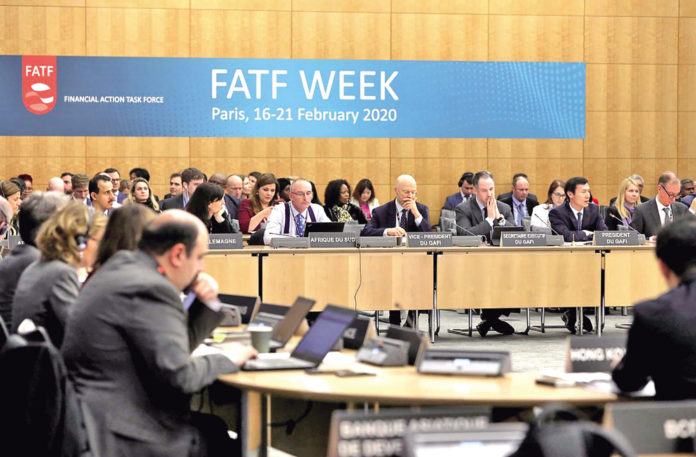At the plenary of the an inter-governmental body established in 1989 to combat money laundering – Financial Action Task Force (FATF) – in Paris, on 16-21 February, Pakistan expected to get about 12 countries to speak in its favour and get it off the ‘grey list’. However, out of the 27 action points that Pakistan had to take to get there, it still needed to act on 13. In the last review meeting in Beijing in January, Pakistan was judged to have taken satisfactory action on 14 action points. It was theoretically possible that Pakistan could move out of the grey list. But that required the votes of at least 15 of the FATF’s 36 voting members.
The FATF meeting was held a week after an anti-terrorism court in Pakistan sentenced Hafiz Saeed, the mastermind of the 2008 Mumbai attack and founder of the LeT, to 11 years in two terror financing cases.
Pakistan should demonstrate that law enforcement agencies (LEAs) are identifying and investigating the widest range of terror funding activities and that terror funding investigations and prosecutions target designated persons and entities, and those acting on behalf or at the direction of the designated persons or entities and demonstrate effective implementation of targeted financial sanctions against all UN-designated terrorists and those acting for or on their behalf, including preventing the raising and moving of funds, identifying and freezing assets and prohibiting access to funds and financial services, the FATF said.
The FATF Plenary noted that till now, Pakistan has largely addressed 14 of 27 action items, with varying levels of progress made on the rest of the action plan. It strongly directed Pakistan to swiftly complete its full action plan by June 2020. Failure to take steps towards prosecuting and penalising terror funding by the next plenary, the FATF will take action, which could include the FATF calling on its members and urging all jurisdictions to advise their financial institutions to give special attention to business relations and transactions with Pakistan.
Grey List
The grey list categorisation means that the so-called improvement in Islamabad’s attitude on terrorism was being noted, but clearly it was far from enough. The improvement essentially lay in the Pakistan government taking over scores of seminaries that preach the terrorism gospel. FATF called for further action to show Pakistan’s commitment to deal with terror funding and money-laundering for terrorist purposes.
The United States was instrumental in the “grey listing” of Pakistan in June 2018 by the 39-member FATF, overriding stiff resistance from China and Turkey, two of Pakistan’s close allies. Islamabad has been since working on implementing a list of conditions laid down by the watchdog to avoid being bumped up to the blacklist, and, under the most optimistic circumstances, be taken off the grey list altogether.
The FATF
The FATF is a Paris-based international watchdog established in 1989 to combat money laundering, terrorist financing and other related threats to the integrity of the international financial system. It currently has 39 members, including two regional organisations – the European Commission and the Gulf Cooperation Council. India is a member of the FATF consultations and its Asia Pacific Group
India’s Efforts
Although, Pakistan is believed to have received strong backing from Malaysia, it failed to impress western nations due to India’s consistent efforts by providing materials and evidence on Pakistan’s inaction to check funding to terror groups operating from its soil.
Indian diplomatic channel saw it as a victory for them. The plenary noted that Pakistan addressed only a few of the 27 tasks given to it in controlling funding to terror groups like the Lashkar-e-Taiba (LeT), the Jaish-e-Mohammad (JeM) and the Hizbul Mujahideen, which are responsible for a series of attacks in India. India has been maintaining that Pakistan extends regular support to terror groups like the LeT, the JeM and the Hizbul Mujahideen, whose prime target is India, and has urged the FATF to take action against Islamabad.
India has been maintaining that Pakistan extends regular support to terror groups like the LeT, the JeM and the Hizbul Mujahideen, whose prime target is India, and has urged the FATF to take action against Islamabad.
Next Course of Action
Pakistan was placed on the ‘Grey List’ by the FATF in June 2018 and was given a plan of action to complete by October 2019 or face the risk of being placed on the ‘Black List’.
In October 2019, FATF did not blackball Pakistan altogether on the terrorism question, placing Islamabad on its “grey” list for a period of another four months till February 2020. Again, at the February 2020 Plenary, the FATF gave an extension of four months to Pakistan to act against organisations involved in terror financing. This was leniency being shown since FATF is currently being chaired by China, which is known to be Pakistan’s all weather ally.
Pakistan’s Cosmetic Steps
An anti-terror court in Lahore in February 2020 sentenced Hafiz Saeed, founder-chief of Jamaat-ud-Dawa, the mother outfit of Lashkar-e-Tayyaba, and an associate to 11 years of rigorous imprisonment on two counts of terror funding and money-laundering, indicating that it was observing the letter of FATF’s instructions. Saeed, a UN designated terrorist on whom the US has placed a $10 million bounty, was arrested on July 17, 2019, in the terror financing cases.This 69-year-old head of the Jamaat-ud-Dawah (JuD), and an aide, were both given five-and-a-half year jail terms in two cases of terror financing by an anti-terrorism court in Lahore.
With the FATF threat looming, a court has meted out punishment, at least for the record. Although, years of diplomatic demands by India to proceed against the terrorist mastermind over the Mumbai 26/11 attacks of 2008, in which 166 persons were killed, had produced no results as the Pakistani courts always found the evidence insufficient. This time the Pakistani judiciary was quick in giving its ruling as a negative FATF recommendation could imperil the 2019 IMF bailout package of $6 billion and the economic reforms tied to it.
Whether the rigorous imprisonment meted out to Saeed (LeT) is observed seriously is moot, considering it is Pakistan, where all state agencies are believed to be compromised, although Saeed has been declared a “global terrorist” by the UN and the US.
Further, the trial of seven people, including LeT operations commander Zakiur Rehman Lakhvi, has floundered in a Pakistani anti-terrorism court for more than a decade with no visible results. Lakhvi was released on bail in April 2015 and his current whereabouts are not known.Pakistani officials have said the trial has not progressed because more evidence and information is required from India, but this claim has been rejected by Indian authorities
On Azhar, Pakistan has told FATF that it could not file an FIR against him since he could not be “found”. However, it is believed that Azhar is in the protective custody of the Pakistan government since 2016 but such reports were not confirmed by authorities. However, he used to release audio messages for his supporters. After Pulwama, he never released any video or audio message and the government also avoided speaking about him and his whereabouts. Since March 2019, government sources claimed several times that he had gone missing
Comments
With Pakistan’s continuation in the ‘Grey List’, it will be difficult for the country to get financial aid from the IMF, the World Bank, the ADB and the European Union, thus further enhancing problems for the nation which is in a precarious economic situation
If Pakistan fails to comply with the FATF directive, there is every possibility that the global body may put the country in the ‘Black List’ along with North Korea and Iran.
Although, FATF has been successful in putting pressure on Pakistan in taking actions to stop terror funding but certain key aspects are left unaddressed.
That being stated, it is in Pakistan’s national interest to prevent it from getting blacklisted. The latter would mean an embargo on all possible international aid it is scheduled to receive and which prove to be detrimental to its economy.



















[…] ALSO READ Pakistan to Continue on FATF’s Grey List […]